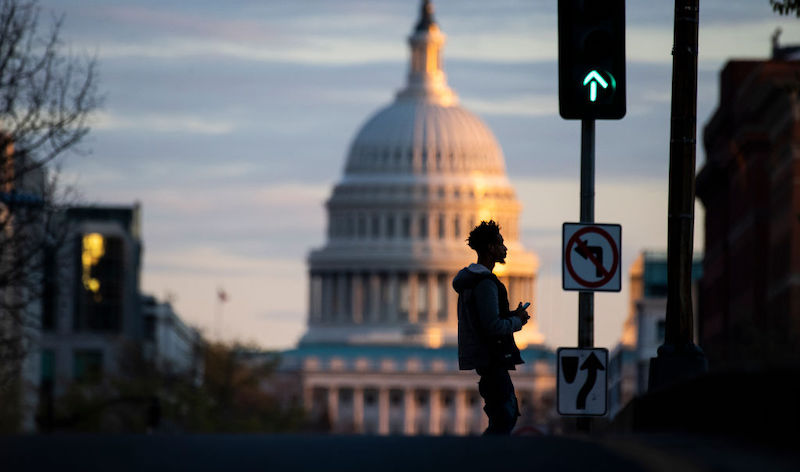
Scholar proposes a new fast-track legislative procedure to affirm agency regulatory authority.
The U.S. Supreme Court’s major questions doctrine has received a significant amount of both praise and criticism. Although some commentators praise the doctrine as a necessary pushback against executive “power grabs,” others scold it as a “deregulatory cudgel.” But no matter what one thinks of its merits, with the Court’s conservative 6-3 supermajority, the doctrine is here to stay.
Accordingly, scholars such as Christopher J. Walker of the University of Michigan Law School are now asking how best to integrate the doctrine into the system of government. In his recent article, Walker argues that Congress should adopt a new streamlined legislative process that would bypass some of the major obstacles to new legislation. As a result, this new procedure would allow lawmakers to respond swiftly to judicial decisions that invalidate agency rules under the major questions doctrine.
Walker contends that, in doing so, the legislative branch could mitigate the doctrine’s deregulatory effect and encourage Congress to become the decision maker on major policy questions that the Court envisions it to be.
In a series of decisions and most explicitly in West Virginia v. EPA, the U.S. Supreme Court introduced the major questions doctrine to the judicial mainstream. According to this doctrine, in matters with major political or economic significance, an agency can only claim the necessary delegation of rulemaking power if it has a “clear congressional authorization.”
Walker notes that agencies often will not be able to rely on textually broad statutory delegations when they wish to respond to urgent regulatory issues. As a result, many legal scholars expect that the major questions doctrine will significantly limit the federal agencies’ regulatory authority.
Walker points out that this immediate deregulatory effect is not necessarily the only outcome of the new doctrine. By requesting more specific delegations, the U.S. Supreme Court also calls on Congress to make the major policy decisions on its own instead of outsourcing them to the executive branch. He explains that Congress, however, will only be able to assume this role as a more active decision maker if it is capable of passing new legislation more readily.
Walker argues that currently this is not the case because of the many obstacles in the legislative procedure. “Vetogates,” such as the U.S. Senate’s filibuster, essentially require a “supermajority” to pass legislation. Lawmaking has become very time-consuming and difficult.
Walker proposes that Congress should create a new fast-track legislative procedure that would be applied if the courts invalidate administrative rules on the basis of the major questions doctrine. He sees this new concept as allowing Congress to respond quickly, empowering it to make more major policy decisions while it also lessens the deregulatory effect.
In Walker’s envisioned bill, instead of disapproving a new rule, Congress would authorize the agency to enact either a recently invalidated rule or to implement a substantially similar regulatory action by amending the agency’s governing statute. In this way, Congress would delegate powers with the level of specificity that the U.S. Supreme Court asks for.
According to Walker’s proposal, both chambers would pass these new delegations by using the same basic rapid response mechanism that Congress authorized with the CRA. Its streamlined lawmaking process is characterized by considerable procedural changes which remove some of the most notorious roadblocks in the Senate.
In particular, the CRA implements a committee discharge mechanism that prevents a vote from being delayed. In addition, the CRA provides that Senators waive all points of order and are neither allowed to propose amendments nor file delay motions. Finally, debates are limited to 10 hours. The effect is that the Senate becomes a filibuster-free zone.
Walker emphasizes that his proposed new process, modeled on the CRA, is only intended to be a supplement to the regular legislative process. To ensure this, he draws on another feature of the CRA. He proposes that Congress should limit the scope of legislation that can be passed to the specific regulatory issue that triggered the alternative legislative procedure. By doing so, neither party would have to worry that the procedure would be used to circumvent the regular legislative process, since Congress could not introduce additional amendments to the bill.
Walker concludes his paper with some remarks about the likelihood that his idea will get bipartisan support in Congress. After all, only if his CRA-like procedure gets enough bipartisan support could it survive the same roadblocks it seeks to limit.
Although he admits that some Republican legislators may welcome the major questions doctrine’s deregulatory effect that his proposal wants to abate, he makes the case that his idea could still be attractive to conservative lawmakers.
He notes that many Republican lawmakers have declared their support for a Congress that takes on more responsibility for policy setting. He argues that for these legislators, his idea should be appealing as it would empower them to make more of the value judgments needed to guide administrative action.
In addition, Walker reasons that his proposed legislation would give the major questions doctrine some statutory recognition and thereby strengthen its overall legitimacy. In his opinion, this could also be appealing to Republicans.
Whether Walker’s proposal will gain traction on Capitol Hill remains to be seen. If it does, it may have the potential to provide the framework for a legislative response to the new doctrine that seeks to reconcile democratic accountability with regulatory flexibility.



